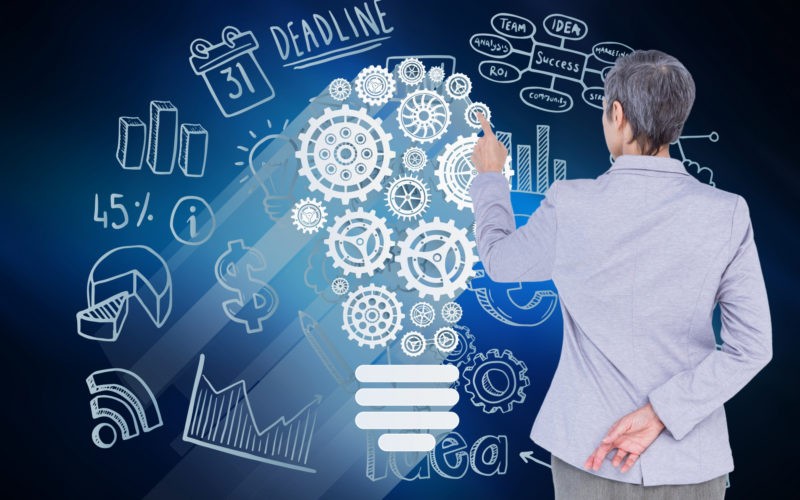Artificial intelligence (AI) is quickly making its mark on the world, and project management is among the many fields that can benefit from its advanced capabilities.
So much so that the global market for AI in project management is expected to reach $5.7 billion by 2028. With such huge potential, many wonder: how can AI be implemented in project management?
By integrating AI into project management tools, businesses can reshape how their teams plan, execute, and monitor projects. This enhances efficiency, improves decision-making, and automates routine tasks, positioning AI as an indispensable part of modern project management and making generative AI development solutions more important than ever.
Keep reading to explore the critical role AI plays in today’s project management tools, highlighting its impact on collaboration, productivity, and overall project success.
1. Enhancing Decision-Making with Predictive Analytics
AI-powered project management tools excel in predictive analytics, which is crucial for making informed decisions. These tools analyze historical data and project trends to forecast potential risks, project timelines, and resource requirements. By doing so, they enable project managers to anticipate challenges and adjust their plans proactively.
For example, AI can predict when a project is likely to fall behind schedule based on past performance data. This allows managers to reallocate resources or adjust deadlines before issues escalate. Predictive analytics also helps in budget management, as AI can identify areas where costs are likely to overrun and suggest corrective actions.
2. Automating Routine Tasks for Increased Efficiency
One of the most significant advantages of AI in project management is its ability to automate routine tasks. From scheduling meetings to updating project timelines, AI-driven tools can handle repetitive tasks that would otherwise consume valuable time.
Automation not only increases efficiency but also reduces the risk of human error. For instance, AI can automatically update project progress based on real-time data inputs, ensuring that all team members have access to the latest information. This eliminates the need for manual updates and reduces the chances of data discrepancies.
Even more, AI-powered tools can automate communication workflows, such as sending reminders for upcoming deadlines or generating progress reports. This ensures that team members stay on track without the need for constant oversight, freeing managers to focus on more strategic aspects of the project.
3. Enhancing Collaboration Through AI-Driven Insights
If you’re a project manager, you understand the importance of collaboration, and AI plays a pivotal role in enhancing how teams work together. AI-driven tools provide real-time insights into team performance, communication patterns, and workload distribution, enabling project managers to optimize collaboration.
For example, AI can analyze communication data to identify potential bottlenecks or areas where team members may need additional support. It can also suggest optimal team structures based on individual strengths and weaknesses, ensuring that each member is assigned tasks that align with their skills.
4. Improving Resource Management with AI
Resource management is a critical component of project management, and AI is proving to be a game-changer in this area. AI-driven tools can analyze resource utilization data to optimize the allocation of personnel, equipment, and budget.
For instance, AI can track resource usage across multiple projects and suggest reallocations to maximize efficiency. If one team member is overburdened, AI can recommend shifting some of their tasks to other team members with lighter workloads. This ensures that resources are used effectively, reducing the risk of burnout and improving overall productivity.
5. Enhancing Risk Management with AI
Risk management is another area where AI is making a significant impact. AI-driven project management tools can identify potential risks early in the project lifecycle, allowing managers to take proactive measures to mitigate them.
These tools analyze various data points, such as project complexity, team dynamics, and historical performance, to identify risks that may not be immediately apparent. For example, AI can detect patterns that suggest a high likelihood of delays or budget overruns, enabling managers to address these issues before they affect the project.
6. Facilitating Data-Driven Decision-Making
AI is revolutionizing how data is used in project management. With AI-powered analytics, project managers have access to vast amounts of data that can inform every aspect of their decision-making process.
These tools can aggregate data from multiple sources, such as project timelines, resource allocation, and team performance metrics, to provide a comprehensive view of the project’s progress. AI then analyzes this data to generate actionable insights, such as identifying trends or anomalies that may require attention.
Beyond internal project metrics, teams can apply how to use AI analytics to automatically synthesize customer reviews and sentiment, turning qualitative feedback into prioritized requirements and early risk signals. Incorporating this voice-of-customer layer improves roadmap validation and helps managers allocate resources toward features with the highest retention impact.
7. AI’s Role in Enhancing Project Planning
Project planning is a complex process that involves numerous variables, from setting timelines to allocating resources. AI plays a crucial role in simplifying this process by providing tools that can generate optimized project plans based on historical data and predictive analytics.
For instance, AI can analyze previous projects to identify patterns and suggest optimal timelines for new projects. It can also recommend resource allocations that have proven successful in similar projects, reducing the time and effort required for planning.
Moreover, AI-driven planning tools can adapt to changes in real-time, automatically adjusting plans as new data becomes available. This flexibility ensures that project plans remain relevant and achievable, even in dynamic project environments.
8. Overcoming Challenges with AI Integration
While AI offers numerous benefits for project management, integrating AI into existing workflows can be challenging. Organizations may face hurdles such as resistance to change, data privacy concerns, and the need for significant upfront investment.
To overcome these challenges, it’s essential to approach AI integration strategically. This includes selecting AI tools that align with the organization’s needs, directing your team members to helpful AI learning resources, and opting for custom AI solutions that meet the unique needs of your business.
By addressing these challenges, organizations can fully harness the potential of AI in project management, leading to improved efficiency, collaboration, and project success.
9. The Future of AI in Project Management
As AI continues to evolve, its role in project management is likely to expand. Future developments may include more advanced predictive analytics, greater integration with other business tools, and the use of AI to facilitate decision-making at all levels of the organization.
Recent research predicts that by 2030, 80% of project management tasks will be run by AI, showcasing the importance of AI adoption to stay competitive in the constantly changing landscape.
In the coming years, AI-driven project management tools will become even more sophisticated, offering new ways to optimize every aspect of project management. Organizations that embrace AI will be better positioned to adapt to changing business environments, stay ahead of the competition, and achieve their project goals.
10. Conclusion
Only 35% of projects today are completed successfully, partly due to the lack of technologies available for project management. With the adoption of AI, machine learning, and other advanced technologies, we expect to see huge changes in project management, allowing businesses to be more efficient than ever.
To stay ahead of the market, the creation of custom AI tools is the key to successful AI implementation. These tailored solutions enable organizations to address their unique challenges and optimize project management processes, ultimately driving higher success rates and delivering better outcomes.












